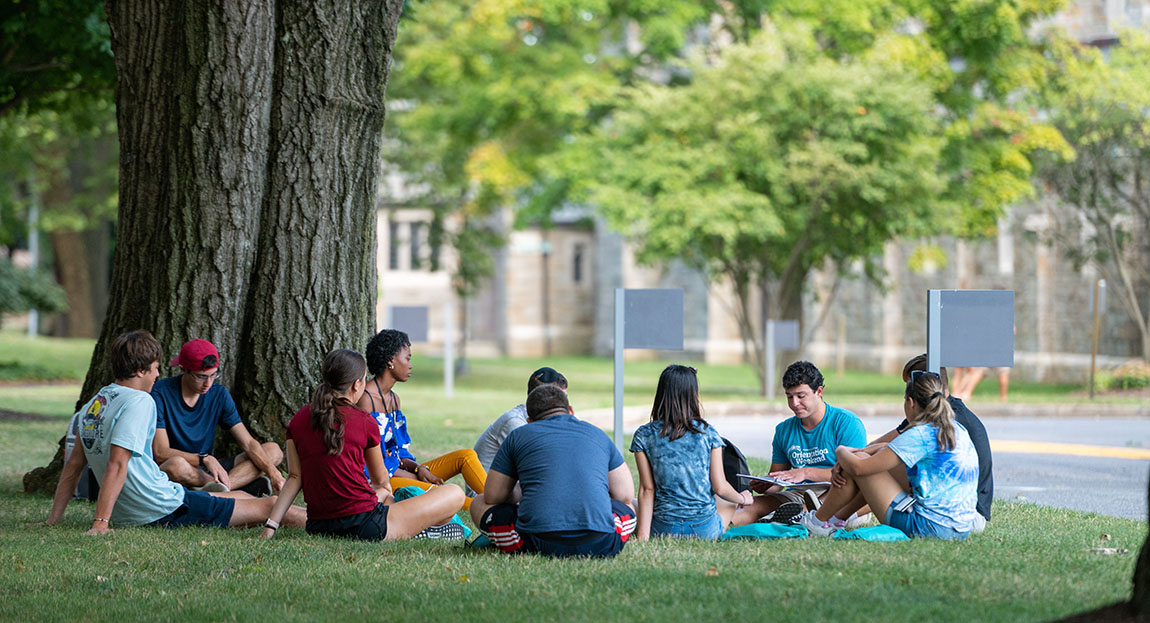Mental Health “Gatekeeper Training” Contributes to a Culture of Care
The training, which was mandatory for incoming students this year, grew out of the College’s partnership with the Jed Foundation, a nonprofit that has consulted with more than 370 colleges and universities with the goal of improving student mental health.By: Meghan Kita Tuesday, September 27, 2022 09:14 AM
 Members of the Class of 2026, pictured here during Orientation, were required to complete mental health "gatekeeper training" before coming to campus. Photo by Marco Calderon
Members of the Class of 2026, pictured here during Orientation, were required to complete mental health "gatekeeper training" before coming to campus. Photo by Marco CalderonAs the Class of 2026 prepared to come to campus for the first time, their pre-arrival online training included some familiar topics (alcohol misuse, sexual misconduct) as well as something new: mental health “gatekeeper training.” The training simulated peers in emotional distress approaching the student and asked the student how they might respond. The idea, says Director of Student Support Services Michele Paules, is to normalize needing and asking for help and to ensure students feel prepared if they or their peers experience a crisis.
“Since COVID, the awareness of students struggling with emotional wellness and physical wellness has been brought to the top of many people’s agendas, and that’s integrated with academic wellness,” Paules says. “We want to make sure that students understand from day one that people struggle and people are going to talk to each other about that.”
This gatekeeper training is a result of Muhlenberg’s partnership with the Jed Foundation, a nonprofit that has consulted with more than 370 colleges and universities with the goal of improving student mental health. Funding to bring this training to campus came from human resources, the Office of the Provost, the Office of the President and the Dean of Students’ Office.
The training will soon be made available to all other students, faculty and staff, likely before the end of the month. The concept of gatekeeper training was introduced to those groups last semester, when the College’s Jed committee distributed an infographic detailing the steps to take to respond to student mental health concerns. Muhlenberg will rely on student groups (fraternities and sororities, athletic teams, resident advisors [RAs]) to encourage completion of the online training among upperclassmen, and employees have already demonstrated interest.
“One thing we know from doing initial surveys with staff and faculty is they really wanted to respond well to students experiencing concerns. They’re thirsty for this information,” Paules says. “I feel positively from the initial feedback when we joined Jed … that we are going to get a high response rate.”
Another facet of the Jed work that’s ongoing is intentional education about Muhlenberg’s medical amnesty policy, which prioritizes the wellbeing of those in emergency situations so students can seek care for themselves and others rather than worry about the repercussions from a drug or alcohol violation. However, students must know about the policy in order for it to be effective, so last semester, each student received a postcard summarizing the policy (including the fact that it applies to mental health crises in addition to physical ones). This semester, RAs went over it with their residents shortly after move-in.
“There is nothing more important than students intervening with one another and calling for help when someone is in distress. The Dean of Students' Office worked closely with [the Student Government Association] to further highlight that the College's medical amnesty policy applies to alcohol and other drug situations and to mental health situations,” says Vice President for College Life and Dean of Students Allison Williams. “When someone needs to call for emergency help, I never want them to be concerned about ‘getting in trouble’ for other issues and worrying if they should prioritize that concern over getting someone immediate support.”
The Jed committee is currently exploring which recommendations from Jed’s strategic plan to pursue next. The ultimate goal is “to continue to raise awareness about mental health concerns and campus resources and to expand people’s thinking beyond seeing mental health prevention as simply the role of Counseling Services,” Williams says. “Tending to our community’s emotional wellbeing and mental health is everyone’s responsibility.”
